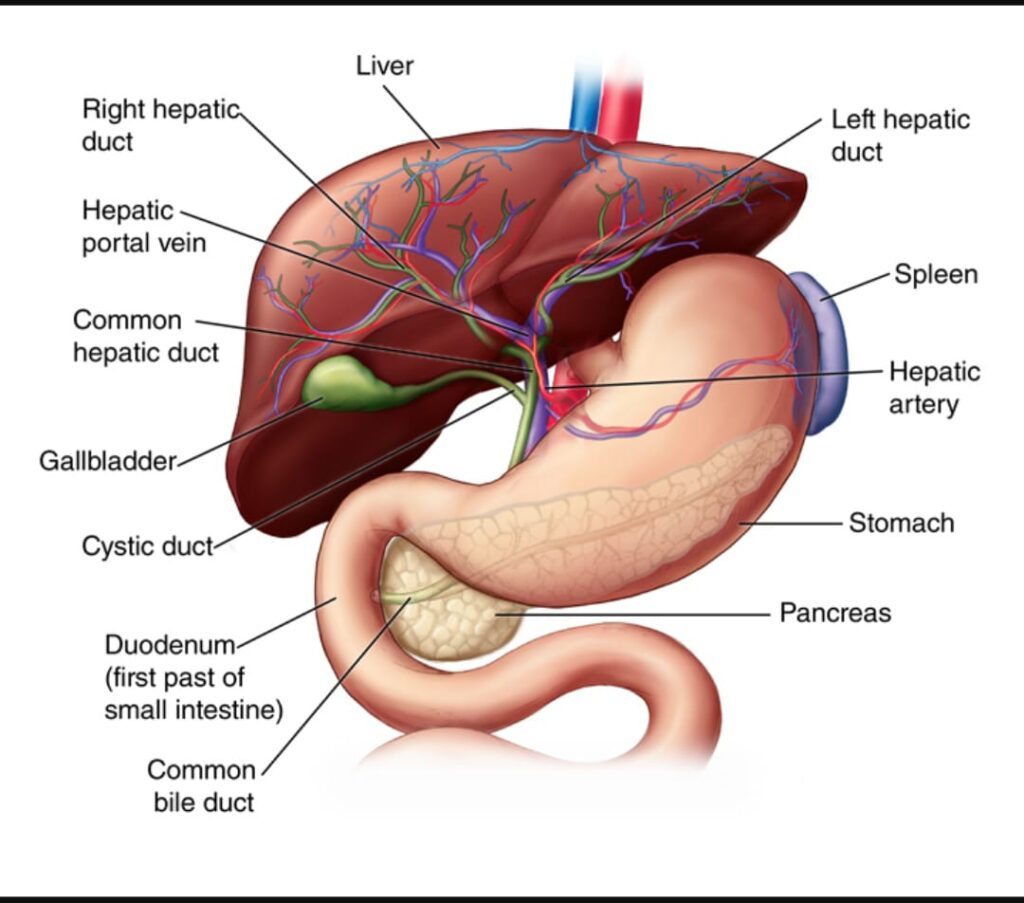The liver is a vital organ located in the upper right quadrant of the abdomen, primarily on the right side of the body beneath the diaphragm. It performs a wide range of functions essential for maintaining overall health and homeostasis. Some of the key functions of the liver include:
- Metabolic Regulation: The liver regulates metabolism by processing nutrients absorbed from the digestive system. It metabolizes carbohydrates, fats, and proteins, converting them into energy or storing them for later use.
- Detoxification: The liver plays a crucial role in detoxifying the body by removing toxins, drugs, and harmful substances. It breaks down and neutralizes toxins, making them easier to eliminate from the body.
- Bile Production: The liver produces bile, a greenish-yellow fluid that helps in the digestion and absorption of fats in the small intestine. Bile is stored in the gallbladder and released into the small intestine when needed.
- Synthesis of Proteins: The liver synthesizes various proteins essential for blood clotting, immune function, and maintaining fluid balance in the body. These proteins include albumin, clotting factors, and immune proteins.
- Storage: The liver serves as a storage site for important substances such as glycogen (stored form of glucose), vitamins (like A, D, E, and K), and minerals (such as iron and copper).
Regarding hormones, while the liver itself does not produce hormones, it plays a significant role in hormone metabolism. It metabolizes hormones produced by the endocrine glands, such as the adrenal glands and thyroid gland, by breaking them down into inactive forms that can be excreted from the body. Additionally, the liver regulates the levels of circulating hormones by synthesizing binding proteins that transport hormones through the bloodstream.
In summary, the liver is a multifunctional organ crucial for metabolism, detoxification, digestion, and maintaining overall health and homeostasis in the body.
Liver disease encompasses a range of conditions affecting the liver, including fatty liver disease, hepatitis, cirrhosis, and others. Diet plays a crucial role in managing liver health. Here are some general dietary recommendations: - Limit Alcohol: For most liver diseases, reducing or abstaining from alcohol is essential to prevent further damage.
- Healthy Weight: Maintaining a healthy weight through a balanced diet and regular exercise can help prevent fatty liver disease and reduce strain on the liver.
- Low-Fat Diet: Reduce intake of saturated and trans fats, as they can contribute to liver inflammation and fatty liver disease. Focus on healthy fats like those found in avocados, nuts, and olive oil.
- Limit Sugar and Processed Foods: High sugar intake and processed foods can contribute to fatty liver disease. Opt for whole grains, fruits, and vegetables instead.
- Moderate Protein Intake: Protein is important for liver function, but excessive protein intake can be harmful. Choose lean sources like poultry, fish, beans, and tofu.
- Monitor Sodium Intake: Excess sodium can lead to fluid retention and exacerbate complications of liver disease, such as ascites. Aim to limit sodium intake by avoiding processed foods and using herbs and spices for flavoring.
- Stay Hydrated: Drinking plenty of water helps flush toxins from the body and supports overall liver function.
- Individual dietary recommendations may vary based on the specific type and stage of liver disease, as well as other health conditions.
These recommendations should be tailored to the individual’s specific needs and possibility
